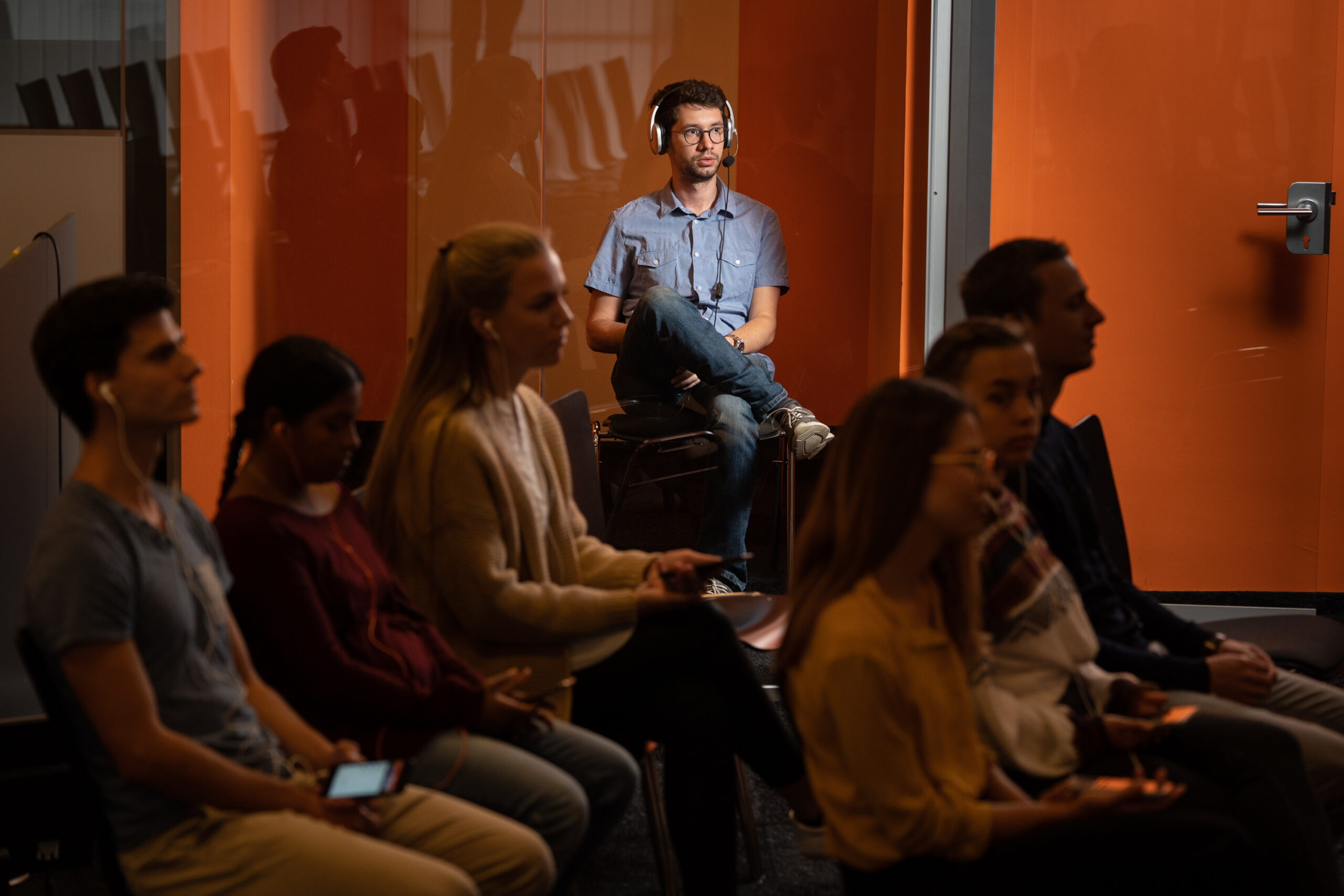Making your event accessible to everyone is crucial nowadays. Learn how you can make your event more inclusive with smart live audio.
Breaking down barriers
Why is accessibility at events so crucial? Because a significant number of your potential audience is affected by different barriers. Let’s have a look at some numbers.
Visual barriers
3.5% of the world’s population live with vision loss and blindness.
32 million Americans alone are blind or have difficulty seeing even with correction, according to Joel Snyder, God Father of Audio Description in the U.S. That’s 8% of the population in the U.S.
75% of American blind people strongly agree that a greater amount of audio-described programming is needed.
Hearing barriers
According to Forbes, an estimated 700 million people worldwide will be affected by disabling hearing loss by 2050.
Language barriers
You might have a hard time to relate how it is to be blind or deaf. But pretty sure you can relate to be somewhere and not understand the language. There are 6.500 languages worldwide!
In this way, language interpretation is the most widley used way to tear down barriers and provide accessibility.
3 reasons why inclusion and accessibility matter
- It is simply the right thing to do. Even if you don’t get a huge benefit out of it, including people with different challenges is the right thing to do as a fellow human being.
- You can increase your reach. Including more people means also a wider audience.
- Inclusion & accessibility is a mega trend of our time. People simply expect it from you. It is a matter of reputation.
So, if inclusion and accessibility are crucial for events, what do we do about it?
Making your event more inclusive with smart live audio
In the past, language interpretation, audio description and other related services could only be offered by companies with the right budget. You needed those little grey boxes with headphones that you might also know from guided tours.
The problem is: These systems are expensive, complicated, and not made for todays digital, interconnected world.
We personally ran into that problem a few years ago. We needed a translation system for the church our founders wife was interpreting for. But as an NPO there was no way to afford such a system. Such analogue systems cost thousands of Euros, even if you want to provide the service only to a handful of people. So we asked ourselves: Why should you buy or rent expensive special equipment if everyone today has a smartphone in their pocket? They have the same functions and much more!
We were looking for an app solution, but as there was nothing on the market that met our needs, we decided to build it ourselves.
This is why we created LiveVoice and this is why our vision is “Live event audio made accessible for everyone, anywhere, anytime.” We empower organizations of all sizes to provide live audio to their audience by offering a simple, flexible and affordable streaming solution.
In some sense, we democratize live event audio the way social media has democratized the media industry. That’s our goal.

How does it work?
LiveVoice turns smartphones and computers into a flexible audio transmission system for various use cases: Simultaneous language interpretation, audio description, audio transmission to hearing impaired and more.
In the past, many events would not offer audio description because it was simply too expensive for a service that involves only a relatively small part of the audience. But with LiveVoice these costs can be cut in such a way that everyone can afford it.
Dr. Marina Ramos of the University of Murcia (Spain), found LiveVoice online and experienced the benefits first hand. The analogue Audio Description equipment that Dr. Ramos would normally need has a purchase price of 60.000 Euros. With LiveVoice you start with a few Euros per day.
“LiveVoice has revolutionized our approach. It offers an affordable and efficient way to stream AD without investing in expensive equipment. We can now extend AD services to so many more venues.”
What’s special about the LiveVoice approach
There are three main benefits LiveVoice offers when it comes to inclusion and accessibility:
1. LiveVoice is affordable for everyone. It works as software as a service and requires no extra hardware, so as LiveVoice we can offer really low prices.
2. It is completely flexible. You can have as many listeners as you want – anywhere in the world. And you can manage everything by yourself!
3. It makes your life simple. Because the audience is bringing their own devices, this means you don’t have to hand out, repair and collect devices.
Plus: It’s a hygienic solution!
Getting practical: How you can use it
LiveVoice works with any smartphone and computer. On computers you use the web browser. For mobile devices there is an app. The sender (e.g. audio describer) uses his own device to speak, and any number of selected people can then listen with their devices. The listeners enter a code, scan a QR code or follow a link to join.
Everything works via the cloud. So, all you need is some type of internet connection. Therefore it is the ideal solution not only for on-site events, but also for online and hybrid events.
With this cloud approach we also create new opportunities, for example remote interpretation. A language interpreter or audio describer can sit anywhere in the world. They see and hear what is going on via video stream and can speak in real time so people at the location can hear it. This does not only reduce costs, but also the carbon footprint.
If you want to try it out simply sign up for a free account here.
Or, if you have any further questions contact us for a demo.

